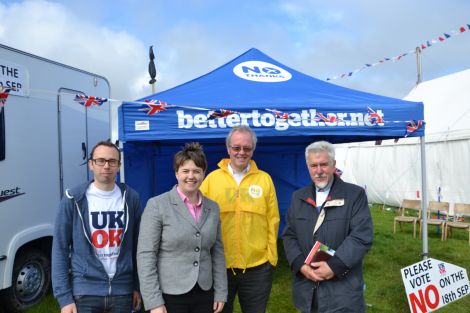Scottish Independence Debate / Tory leader in isles to make case for unity
SCOTTISH Conservative party leader Ruth Davidson has insisted that the Better Together campaign is not trying to downplay the health of the North Sea oil and gas industry ahead of September’s independence referendum.
Speaking on a visit to Shetland where she took a turn at manning the local Better Together stall at Wednesday’s Cunningsburgh Show, Davidson said she recognised there was a great deal of oil and gas work going on around the islands.
But she said that did not necessarily translate into higher revenue for the UK Government because fossil fuels are becoming increasingly expensive to extract.
Yes campaigners in the islands have suggested that the rest of the country seems largely unaware of the extent to which Shetland is undergoing a second oil and gas boom.
Davidson reaffirmed Northern Isles MP Alistair Carmichael’s dismissal of “conspiracy theories” emanating from the Yes camp, some of whom tried to claim Prime Minister David Cameron’s visit in late July was in some way connected to a secret new oil find west of Shetland.
“Everybody is so busy with the work that’s going on,” she told this website, “and that’s great for Shetland, and it’s good for the economy in general.
“I think what everyone has got to remember is when the oil is harder and harder to get out, it doesn’t necessarily turn out more receipts.”
She said the industry enjoyed a stable and secure regime as part of the UK, but it would be dangerous for an independent Scotland to rely too heavily on oil proceeds.
Davidson said: “Depending on how it fluctuates it [oil and gas] is between one and two per cent of the UK economy. In a separate Scotland it’s a huge percentage – if you look at the fall in receipts, over just one year, it was more than the entire education and schools budget for the whole of Scotland.”
Become a member of Shetland News
Staying on the topic of energy, when asked about the ongoing row over Viking Energy’s proposed 103-turbine wind farm in the isles, she said the Tories believed there was “a place for wind in the energy mix”.
“If you’ve got an enormous wind farm that doesn’t have public support, that doesn’t fit with the landscape of the area, then you should think very carefully before you go ahead with that.
“It’s not for me to say what’s best for Shetland in this instance, but we believe that in wind farm and planning legislation, there should be a stronger voice for local people to have a say.”
Asked whether her party backed an interconnector cable hooking Shetland up to the National Grid, she replied: “We want to see island communities in Scotland thrive, and if this is one of the ways in which it can then we would support it, but only with local community support – we would never impose something like this on Shetland.”
With just a few weeks until the 18 September referendum, Davidson said believed “very strongly” that Shetland will return a No vote and she was looking forward to “putting forward a positive case for the UK” during her brief visit.
The UK Government’s offer in response to the Our Islands Our Future campaign is imminent, and Davidson said she was a strong believer in localism.
“I think what this referendum campaign has really brought to the fore in people’s minds is how we make the UK work for everybody in it, and that means for island communities as well as devolution to national parliaments,” she said.
“What we have to make sure is that devolution doesn’t stop at Holyrood. The SNP has been the most centralising Scottish Government that we have seen, in terms of how they’ve grabbed power to the centre – taking power away from colleges, police forces, fire brigades… and we need to hand powers back to local communities.”
The Scottish Tories were latecomers to the devolution party, having opposed the creation of the Scottish Parliament in the 1997 referendum campaign.
Following the publication of its Strathclyde Report, the Conservatives are now offering some additional powers to Holyrood.
Davidson said the UK party had also put forward the 2012 Scotland Act, and in the event of a No vote she hopes cross-party agreement can be secured to strengthen the devolved settlement.
Become a member of Shetland News
Shetland News is asking its readers to consider paying for membership to get additional perks:
- Removal of third-party ads;
- Bookmark posts to read later;
- Exclusive curated weekly newsletter;
- Hide membership messages;
- Comments open for discussion.
If you appreciate what we do and feel strongly about impartial local journalism, then please become a member of Shetland News by either making a single payment, or setting up a monthly, quarterly or yearly subscription.





























































